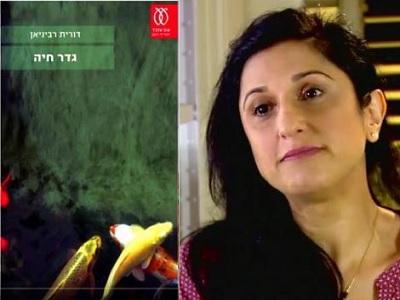
By Jamal Kanj
How can a two-year-old novel become a best seller? Censorship is the short answer. The most important question is, however, why would the “Jewish democracy” censor a love fiction between a Jew and non-Jew?
The banned book Borderlife was based on a love story between an Israeli woman and a Palestinian man. According to Haaretz newspaper, the novel was recommended in 2015 for Hebrew high school literature classes by “a professional committee of academics and educators, at the request of a number of teachers.”
The Israeli Ministry of Education rejected the fiction work for fear it would corrupt young Jewish minds. In explaining its decision, the ministry wrote “Intimate relations between Jews and non-Jews threaten the separate identity.” The Israeli Education Ministry wrote that “young people of adolescent age don’t have the systemic view that includes considerations involving maintaining the national-ethnic identity of the (Jewish) people and the significance of miscegenation.”
In layman’s terms, the educational authorities in the only “democracy” in the Middle East wanted to protect the fledgling Jewish minds from the plague of assimilation and intermarriages between people of different races. Wasn’t this what Adolph Hitler had advocated for the Aryan race?
But in an Orwellian love is hate doublethink, Dalia Fenzig, the head of the Israeli ministry committee that decides the Hebrew Literature matriculation reading list, told Israeli Army Radio: “The (love fiction) book could incite hatred…”
Fenzig further implied that Israeli societal racism rendered the book unfit for Israeli students. “Many parents in the state school system would strongly object to having their children study the novel,” she said.
Shlamo Herzig, the ministry’s head of literature studies that recommended the book was more forthright in addressing Israeli structural racism: “The acute problem of Israeli society today is the terrible ignorance and racism that is spreading in it.”
In a newspaper interview with the Telegraph, Israeli book author Dorit Rabinyan talked about the real fundamental issue for banning her work.
“My book’s only ‘harm’, if you want to call it that, is that a young (Israeli) person may get another perspective on Palestinians to the one they’re being exposed to by politicians and the news … he’s a Palestinian and a full human. That is the power of the book and the reason for it to be banned.”
It is worth noting that the book’s author is anything but an ardent Zionist. She espoused the racist Zionist ideology that gave her Jewish parents the right to emigrate from Iran to live on land stolen from native Palestinians. This is while, like most Zionists, she rejects the right of those Palestinians to return to their homes.
Not surprising, the whole fiasco was very likely engineered by the ex-American, Israeli Minister of Education Naftali Bennett who previously said such things as “when Palestinians were climbing trees, we already had a Jewish state” and “I’ve killed lots of (Palestinian) Arabs in my life, and there’s no problem with that.”
Bennett sees his educational role, “in the only ethnocentric diplomacy” as the national custodian to ensure Jewish blood remains pure and Palestinian-free, even in fiction tales.
In the face of blatant Israeli ethnocentric racism against non-Jews, the onus is on Jewish civil rights organizations, especially those advocating equality in the US and Europe to speak up against Jewish racism in Israel.
Jewish organizations cannot demand justice and equality when in the minority, while supporting a government perpetuating inequality under a self-proclaimed Jewish state majority.
– Jamal Kanj (www.jamalkanj.com) writes regular newspaper column and publishes on several websites on Arab world issues. He is the author of “Children of Catastrophe,” Journey from a Palestinian Refugee Camp to America. He contributed this article to PalestineChronicle.com. (A version of this article was first published by the Gulf Daily News newspaper.)




